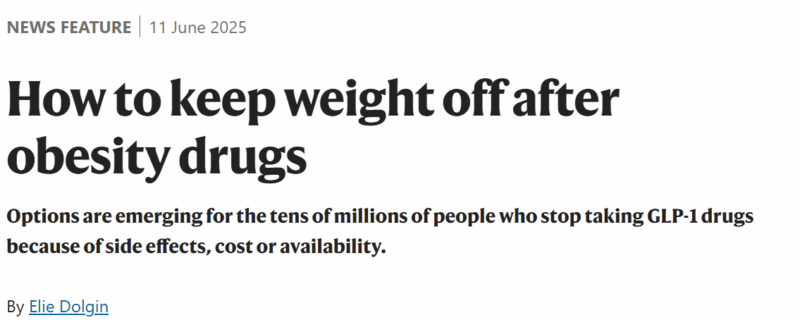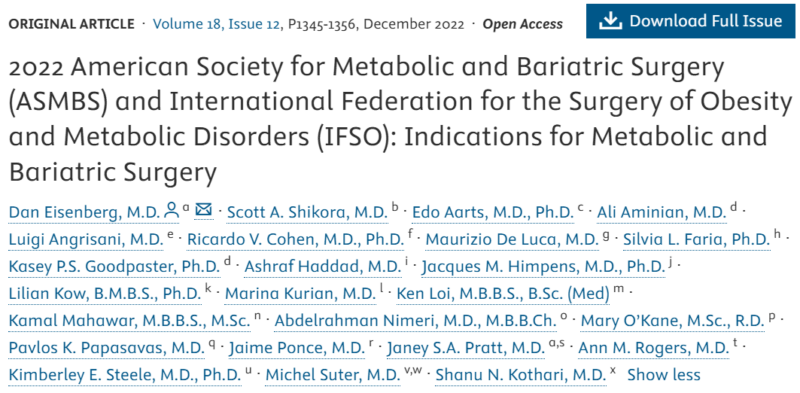
Miguel Bronchud About Impact of GLP-1 Discontinuation and Emerging Treatment Options
Miguel Bronchud, Co-Founder and Advisory Board at Regenerative Medicine Solutions, shared a post on LinkedIn:
“Options are emerging for the people who stop taking GLP-1 drugs because of side effects, cost or availability?
Not surprisingly “to reduce the size of the stomach” is one of them …
Although nobody can doubt about the obvious clinical benefits of the GLP-1 drugs (including lower rates of cardiovascular deaths and lower risk of certain cancers) the benefits are not always long lasting and for a variety of reasons (including costs or insurance coverage) less than 40% of patients (the exact % is unknown) end up giving them up.
Title: Discontinuation and Reinitiation of Dual-Labeled GLP-1 Receptor Agonists Among US Adults With Overweight or Obesity
Authors: Patricia J. Rodriguez, Vincent Zhang, Samuel Gratzl, Duy Do, Brianna Goodwin Cartwright, Charlotte Baker, Ty J. Gluckman, Nicholas Stucky, Ezekiel J. Emanuel

Endoscopic surgery, classical bariatric surgery or since the 1980s to reroute the flow of food through the gut or to restrict the stomach’s size, might also regain wider appeal. And the search is picking up for other drugs that could offer lasting alternatives for a post-GLP-1 population.
That momentum is driven by a convergence of factors: chronic shortages of GLP-1 therapies, high costs, insurance barriers and in a minority of cases…muscle mass loss and people with gastrointestinal symptoms.
Title: Anti-obesity drugs’ side effects: what we know so far
Author: Mariana Lenharo

As a result, many people who start the drugs ultimately stop — with discontinuation rates in clinical trials ranging from 37% to 81% in the first year…
And once treatment ends, the weight lost often piles back on.
As demand grows for complementary strategies, the landscape of weight-loss treatment, which has been overtaken in recent years by semaglutide and tirzepatide, is now broadening again. In this way, says Ricardo Cohen in Nature Communications:
Title: How to keep weight off after obesity drugs
Author: Elie Dolgin

“The new drugs are a gateway for people seeking obesity care? “
Bariatric surgery has a strong safety record, with rates of serious complications and mortality that are comparable to, or even lower than, those of common procedures such as gallbladder removal and knee replacement.
Still, many people with obesity view bariatric surgery as a last resort. The proportion of eligible individuals who undergo the procedures has remained stubbornly low — around 1% in the United States, and not much higher in any other country.
The arrival of semaglutide and tirzepatide offered a way to reach the other 99% — promising to achieve similar weight reductions without the invasiveness, recovery time or stigma often associated with surgical intervention.In 2022*, the IFSO and its US counterpart revised their guidelines, lowering the recommended body mass index thresholds for surgery eligibility, aiming to make the procedure available to more people who could benefit
*2022 American Society for Metabolic and Bariatric Surgery (ASMBS) and International Federation for the Surgery of Obesity and Metabolic Disorders (IFSO): Indications for Metabolic and Bariatric Surgery
As obesity continues to be an important public health concern- including in children- opportunities to expand the surgery’s reach to adult people with risk factors who discontinue GLP-1 therapy – or who fail to achieve results with medication alone — remains an option.”
Title: 2022 American Society for Metabolic and Bariatric Surgery (ASMBS) and International Federation for the Surgery of Obesity and Metabolic Disorders (IFSO): Indications for Metabolic and Bariatric Surgery
Authors: Dan Eisenberg, Scott A. Shikora, Edo Aarts, Ali Aminian, Luigi Angrisani, Ricardo V. Cohen, Maurizio De Luca, Silvia L. Faria, Kasey P.S. Goodpaster, Ashraf Haddad, Jacques M. Himpens, Lilian Kow, Marina Kurian, Ken Loi, Kamal Mahawar, Abdelrahman Nimeri, Mary O’Kane, Pavlos K. Papasavas, Jaime Ponce, Janey S.A. Pratt, Ann M. Rogers, Kimberley E. Steele, Michel Suter, Shanu N. Kothari

More posts featuring Miguel Bronchud on OncoDaily.
-
Challenging the Status Quo in Colorectal Cancer 2024
December 6-8, 2024
-
ESMO 2024 Congress
September 13-17, 2024
-
ASCO Annual Meeting
May 30 - June 4, 2024
-
Yvonne Award 2024
May 31, 2024
-
OncoThon 2024, Online
Feb. 15, 2024
-
Global Summit on War & Cancer 2023, Online
Dec. 14-16, 2023
